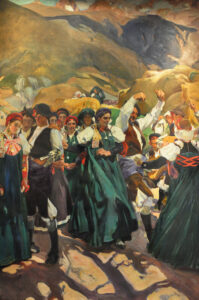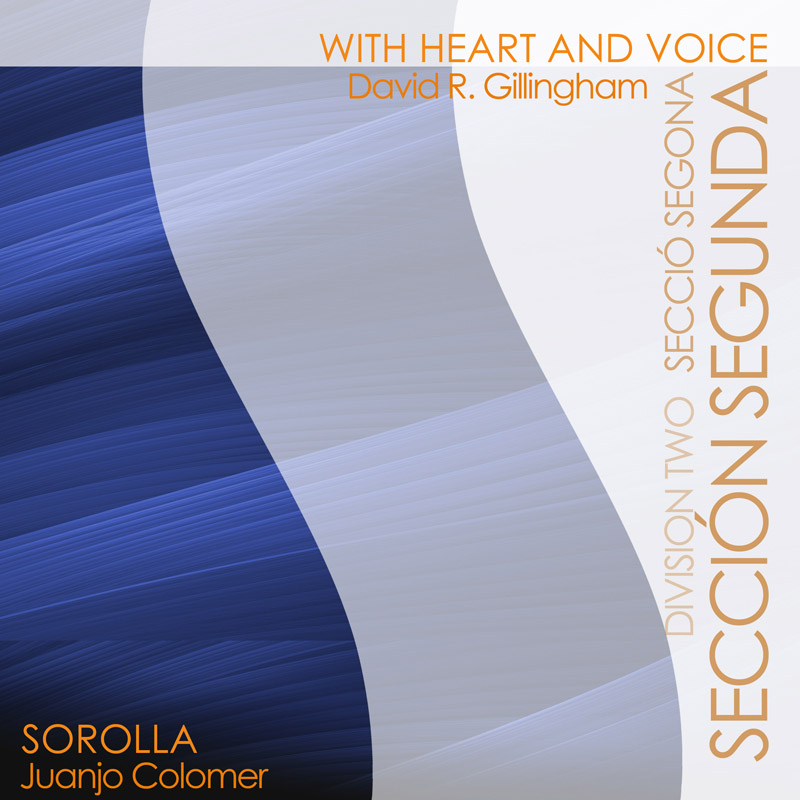The bands participating in the Division Two of the 2023 “City of Valencia” International Music Band Contest will have to interpret as compulsory pieces the scores “With Heart and Voice” by David R. Gillingham and «Sorolla – Jota del ballet» by Juanjo Colomer.
BIOGRAPHY DAVID R. GILLINGHAM
David R. Gillingham (1947) earned Bachelor and Master Degrees in Instrumental Music Education from the University of Wisconsin-Oshkosh and the Ph.D. in Music Theory/Composition from Michigan State University. Many of his works for winds are now considered standards in the repertoire.
His numerous awards include the DeMoulin Award for Concerto for Bass Trombone and Wind Ensemble and the International Barlow Competition (Brigham Young University) for Heroes, Lost and Fallen. His works are regularly performed by nationally recognized ensembles including the Prague Radio Orchestra, Cincinnati Conservatory of Music Wind Ensemble, The University of Georgia Bands, North Texas University Wind Ensemble, Michigan State University Wind Ensemble, Oklahoma State Wind Ensemble, University of Oklahoma Wind Ensemble, Florida State Wind Orchestra, University of Florida Wind Symphony, University of Illinois Symphonic Band, Illinois State Wind Symphony, University of Minnesota Wind Ensemble, Indiana University Wind Ensemble and the University of Wisconsin Wind Ensemble.
Currently Dr. Gillingham is a professor of music at Central Michigan University and the recipient of an Excellence in Teaching Award (1990), a Summer Fellowship (1991), a Research Professorship (1995), and most recently, the President’s Research Investment Fund grant for his co-authorship of a proposal to establish an International Center for New Music at Central Michigan University. He is a member of ASCAP and has been receiving the ASCAP Standard Award for Composers of Concert Music since 1996.
COMPULSORY PIECE: «WITH HEART AND VOICE»
With Heart & Voice was commissioned by Apple Valley High School Bands, Scott A. Jones, director (Apple Valley, Minnesota), to commemorate the 25th year of existence of this high school.
Thematically, the work is based on the Apple Valley High School Alma Mater, an old Spanish hymn which has made its way into most church hymnals under the name of «Come, Christians, Join to Sing.» It is perhaps fate that this hymn, a particular favorite of mine, happens to be the tune used for the Alma Mater. Christian Henry Bateman wrote the words for the hymn in 1843 and the first verse contains the line, «Let all, with heart and voice, before his throne rejoice.» Hence, the title, With Heart and Voice: the «voice» in this case is the music and the «heart» is the emotion that the music renders in celebration.
Although the work is largely celebratory in nature, it begins with a feeling of reticence and apprehension, much like the beginnings of Apple Valley High School. It was at one time only an idea or perhaps only a sketch in the mind of the architect. Small fragments of the Alma Mater are heard in the opening moments of the piece. The piece gains momentum, texture and volume in this opening section culminating in a dramatic statement of the first four notes of the theme. A calmness follows and a lyrical flute solo enters.
This new material represents the uniqueness of the «mission» of a new school which will have roots in academic excellence and commitment to the visual and performing arts. The euphonium echoes the flute and soon more instruments join in and the section culminates with a dramatic fanfare. This is followed by a transitional section with much dissonance and rhythmic activity, equated to the challenge of bringing life to this new school. A glorious statement of the Alma Mater follows signifying the dedication of Apple Valley High School, twenty five years ago. The ensuing section begins as a fugue with underlying unsettling rhythmic activity in the percussion. The obvious reference of this section is the challenge-maintaining the goals and mission of the high school. The section becomes frantic and desperate, but soon subsides into peacefulness. The peacefulness is stated by the marriage of the «Alma Mater » theme and the «Mission» theme…after all, for the High School to survive, it must never forget its mission. An extended finale follows which celebrates both themes in playful, joyful, and dramatic exuberance
.
BIOGRAPHY JUANJO COLOMER
Juan J. Colomer (Juan José Revueltas Colomer) was born in Alzira in 1966. He studied at the Alzira Musical Society, at the Valencia Superior Conservatory of Music and at Berklee College of Music (Boston) where he specialized in Film Scoring.
Shortly after he moved to Los Angeles where he continued to compose soundtracks for films that won, among others, a First Prize in Montecarlo, an Ariel nomination in Mexico and another at the Shockerfest Festival in California.
He has worked as an orchestrator for Plácido Domingo, José Carreras, Diana Ross, Dionne Warwick, Alejandro Fernández, The Three Tenors, etc.
He has received commissions from the National Orchestra of Spain, International Horn Symposium, Philip Jones International Competition (France), Center for the Diffusion of Contemporary Music, Spanish Brass, SBALZ Festival, Fundación Autor, Orchestra of the Community of Madrid, Centro National of Musical Diffusion, Valencian Institute of the Music, etc.
His ballet “Sorolla”, commissioned by the National Ballet of Spain, based on the murals by the Valencian painter exhibited at the Hispanic Society in New York, was premiered in June 2013 at the Naves del Matadero in Madrid.
In 2010 he founded the Valencia Cultural Point in Los Angeles and «Artistic Soirées», and is the creator and General Director of the «LA Grand Ensemble».
COMPULSORY PIECE: «SOROLLA – JOTA DEL BALLET»
 The ballet «Sorolla» was commissioned and premiered by the National Ballet of Spain in June 2013. The work is based on the fourteen murals that the painter painted about a century ago and which are on display at the Hispanic Society in New York.
The ballet «Sorolla» was commissioned and premiered by the National Ballet of Spain in June 2013. The work is based on the fourteen murals that the painter painted about a century ago and which are on display at the Hispanic Society in New York.
Originally written for a symphony orchestra, each number corresponds to one of the murals and represents different scenes from Spanish folklore and traditions. Specifically, this adaptation for band is La Jota (Aragón).
One of the particularities of this Jota is that, due to the specific needs of the production, it was decided not to include the sung part of the jota, where the music normally relaxes a bit, thus the whole number is of a great dynamism and brilliance.

